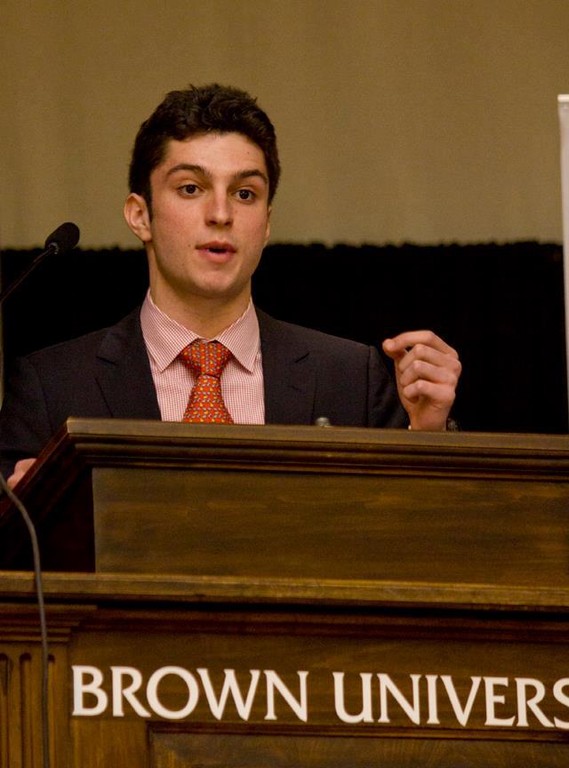
Sam Gilman is a sophomore at Brown University concentrating in public policy and American institutions. He co-founded Common Sense Action with two other Brown students, Andrew Kaplan and Heath Mayo, and was one of the organizers of the Feb. 23 Rhode Island Fiscal Summit, the first statewide, student-organized convention about his generation’s economic priorities. Gilman began developing the idea for Common Sense Action while interning for the Bipartisan Policy Center last summer in Washington, D.C.
Common Sense Action is Brown University’s contestant in the Up to Us competition, a nationwide contest for college students to design and run campaigns around the issues of rising federal debt, economic opportunity and investment in the future. Gilman has also participated in The Can Kicks Back, a Millennial-driven campaign to fix the national debt.
PBN: As one of the coordinators of the Rhode Island Fiscal Summit hosted by Brown University’s Common Sense Action, what was the main reason the group decided to host the event?
GILMAN: Common Sense Action decided to host the Rhode Island Fiscal Summit because it is high time our generation claims a voice in the policymaking discussion. We convened a group of bipartisan student leaders from across the Ocean State. Representatives from the University of Rhode Island, Rhode Island School of Design, Roger Williams University, Rhode Island College and Brown University attended the summit. We hoped the event would trigger some desire for student leaders to take the conversations back to their respective campuses. What emerged from that idea was the first state-wide, student-organized conversation about our generation’s economic priorities in this country. One Brown student was inspired by the event to email: “The event this past Saturday was not only impressive but truly inspiring. I have since been thinking about the crisis in Washington in a way I do not think I ever have before.”
PBN: Rhode Island’s sluggish economy, high unemployment rate and efforts to attract new business have been issues for quite some time. Do you think there was information or understanding that came as a result of the summit and the perspective of the speakers that shed new light on these issues?
GILMAN: Our speakers spoke about the overall Rhode Island economy and specifically how “sequester” could impact the state. One of the most important impacts of the summit was the recognition that there are new voices in the discussion. Of course, no silver bullet solutions emerged for Rhode Island’s sluggish economy. However, the major take-away was, in the words of Cranston Mayor Allan Fung, “Organize, organize, organize.” If we desire to create a state or national investment strategy, than we, the generation that will receive the highest return on those investments, must mobilize for them. One student asked Congressman Weygand, “How do people like us get our voices heard?” He responded with a quiz. “Are you registered to vote here?” “Do you know who your representatives are?” “Did you in fact vote here?” “Have you ever approached your representatives about an issue?” According to Weygand, only about 15% of people can actually answer those questions in the affirmative. If we want to get our voice heard, we need to increase the percentage of young people who can pass Congressman Weygand’s quiz.
PBN: One of the central questions addressed in the summit was: How can Americans from both parties come together to build a prosperous and sustainable economic future? Do you think that question was answered, and if so, what suggestions surfaced?
GILMAN: If we were able to find a true answer to that question, someone should elect one of us to Congress. Jokes aside, the summit was a good first step. It featured something not often seen in Washington – a sensible discussion without name calling with a goal towards solutions, not posturing. One of the biggest challenges to bipartisan problem-solving is simply getting people from different parties, who believe in different ideologies, to sit down with each other and see eye-to-eye. The Summit featured Democrats and Republicans, including student leaders from the College Democrats and the College Republicans of Rhode Island. That alone says something. As Brown University President Christina Paxson said at the summit, “This group is doing what our members of Congress can’t do, which is bringing Democrats, Republicans and Independents together.” Beyond bringing Democrats and Republicans together, we believe in the possibility that issue-based coalitions can come together over different components of a comprehensive, pro-growth deficit reduction and investment strategy. Regardless, it is essential that Americans – especially young Americans – take the crucial first step of engaging members of the opposing party.
PBN: The other central question addressed at the summit was: What lessons can Rhode Island teach the nation about solving a debt crisis? What did the summit reveal as some of those lessons?
GILMAN: Congressman Weygand, Mayor Fung, and Laurie White, who’s president of the Greater Providence Chamber of Commerce, each brought different local insights about the impact of debt crises on Rhode Island and the lessons the Ocean State can teach the nation. Laurie White walked us through the different stakeholders who claim a stake in budget discussions, such as citizens’ groups and “small business people,” not just the regular lobbyists. Mayor Fung and Bob Weygand both recounted the difficult decisions they have had to make facing budget crunches. In particular, Congressman Weygand related the hard choices he had to make in the face of a 30 percent reduction of URI’s funding . Mayor Fung related the pain of having to reform pensions to ensure their solvency. Yet, Rhode Island teaches us that if you can have a series of frank and contentious discussions with all the relevant stakeholders, including the general public, you can pass legislation that is bound by public consensus.
PBN: The stated goal of the summit was to create networking opportunities and connections and use them as the launching point for student action statewide. Has the Common Sense Action group arrived at specific actions and, if so, when do you plan to launch them? What are the actions? How can others in the community and the state participate in these actions?
GILMAN: The Rhode Island Fiscal Summit certainly accomplished the goal of creating networking opportunities and connections amongst student leaders, speakers, and community members. More than 125 people attended the summit. Student leaders from five different schools – representing both parties – mingled with community members, businesspeople and state elected officials. It was designed to be a launch point for Common Sense Action conversations on college campuses and in communities across the state, and we have been in contact with several student leaders who are considering bringing Common Sense Action to their campuses. For the time being, we will have open source actions through “dorm meetings” on college campuses and “house meetings” in the community as we plan to proceed. If we were to arrive at specific actions after one kick-off summit, we would not be being true to our mission of creating an “open source” grassroots network. If other people in the community would like to host a Common Sense Action forum with their social circles, they can reach out to us by emailing: sam@commonsenseaction.org.
We were also fortunate enough to join The Can Kicks Back for their Hill Day in Washington, D.C. We met with various Congressional leaders. We advocated for a balanced bipartisan approach to fixing the debt. By that, we mean a plan that reduces the unsustainable growth in entitlements, raises revenue and replaces the sequester with a cut-and-invest committee that will reinvest the savings toward critical investment in research, education, and infrastructure.












